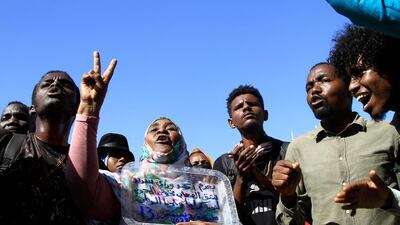On paper, the signing last week of a peace framework between Sudan's ruling military-civilian coalition is a moment to celebrate.
It was welcomed abroad. The Quad and Troika, multilateral groupings that include Norway, Saudi Arabia, the UAE, the UK and the US, said it was: "an essential first step toward establishing a civilian-led government and defining constitutional arrangements to guide Sudan through a transitional period culminating in elections."
The country has needed this optimism for a long time. And while real progress has been made politically, momentum must now be replicated in other domains.
Sudan has had a tough few years. The ousting of its former president Omar Al Bashir in 2019, while important for the political future of the country, has not yet helped people on a material level, both economically and in terms of security.
Creating political and social stability, both underpinned by economic stability, must be the guiding priority of the Sudanese government. This endeavour is achievable, but there is no time to lose.
It is tragic that a country with so much potential has languished for so long, with devastating consequences. Today, almost a million more people are in need of humanitarian assistance than last year. The overall number is at least, 14.3 million, according to Acaps, an NGO.
That number is even more troubling when Sudan's economic promise specifically is considered. A good example of squandered potential is the agricultural sector. Sudan could be a breadbasket to the region, indeed the world.
In May, Sudan’s Minister of Trade and Supply Amal Saad said her country could help ease food insecurity in the region, which is threatened by the war in Ukraine. Her case is strong. Sudan's climate, vast amounts of arable land and access to the Nile as a water source means its agriculture is robust enough to ease supplies on nothing less than a global scale. But generating this productivity is a long way off. Ms Saad called for regional investment, citing funding as a key impediment to the sector's growth.
It is a similar story across a number of areas of the economy. Fortunately, the country recently secured a major investment that could serve as a model for future funding. On Tuesday, Sudan made an early agreement with a group led by the UAE's AD Ports Group and an investment firm led by Osama Daoud Abdellatif, the chairman of Sudanese conglomerate DAL, to construct and operate a new airport, port and economic zone on the Red Sea. The basis is an investment of $6 billion. A 450km road will also connect the port with key agricultural regions.
This is a major, commercially viable package. Many more are yet to be realised. Investors across the region should take note. They will not only be embarking on what could be a profitable journey, but also one that helps secure the future of the country, and help last week's peace framework actually last.






















